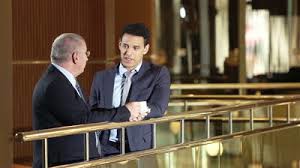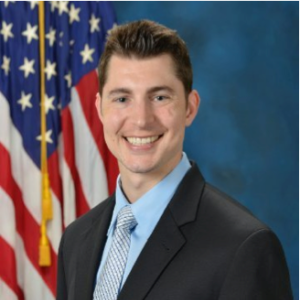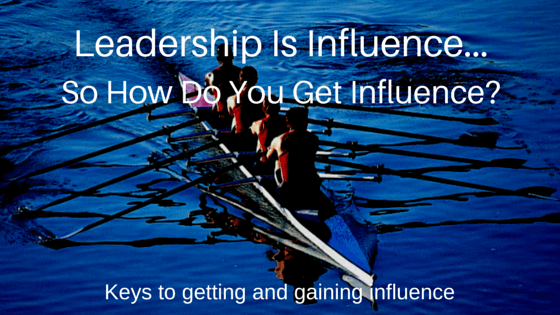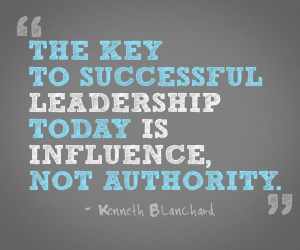As A Leader, How Do You Get And Gain Influence?
Guest post by Brian Reese, President of Eternal Leadership Consulting
It took me 10 years of both military and industry experience to define my own “what and how” of leadership. After studying, interviewing, and watching leaders perform in numerous capacities ranging from non-profits to military combat, I have come to believe that leadership is about influence. This influence can be with just one person or a five thousand-person company, the number of people doesn’t matter.
Success
Ultimately, the success of a leader is defined by his/her ability to build high-performing teams that win and achieve exceptional organizational results. Thus, the “what” of leadership is the ability to get results and the “how” of leadership is the ability to build high-performing teams that win.
Therefore, everything else, such as communication, motivation, and inspiration, are supporting characteristics that help leaders build high-performing teams that win and achieve exceptional organizational results.
Okay, you’re thinking how can I apply these concepts to my own leadership skills? I’d like to share some personal stories with you to give you some ideas.
Perhaps the best book one can read about influence is a timeless classic by Dale Carnegie titled “How to Win Friends and Influence People.” In the book, Carnegie hits on 30 timeless principles to lead, win, and influence people.
Stories From My Leadership Journal
Last week, an angry customer called into our office. She had been trying to get information from our office about a job announcement. Two different people had failed to get through to her, which left everyone frustrated and in complete disconnect.
She called in a third time, and things started to spiral out of control, so I walked over and asked my teammate to turn on the speakerphone. My first question to her was “Ma’am, what is your first name? Is it okay if I call you by INSERT NAME.” The conversation immediately turned for the better because I now knew her first name.
Next, I asked her to explain how I could personally help her. She began to explain that she had a JD and that she’s more than qualified to join the Government as a Contracting Officer, yet nobody was listening to her qualifications. What I quickly realized was that status was very important to her–but nobody bothered to ask about her background. Remembering the principle of “make the other person feel important,” I said something like, “Wow that’s great that you have a JD.
I have a couple friends who have their law degrees and I know it is a tough road to get there. By the way, I have hired two other JDs into the Air Force and they became exceptional Contracting Officers. We would love to have you join our team.” The conversation immediately turned, she became positive and upbeat. Anyway, she applied last week and we’re going to hire her into a full time position next week. To top it off, she emailed the highest person in our chain of command to thank our team for helping her out.
Story Two
A few years ago, I was a brand new First Lieutenant at Hanscom AFB, MA. I had been on the job for about two weeks. My bosses, bosses, boss, the GS-15 (Colonel equivalent) had met me one time and talked about how much he was looking forward to working with me. A week or so later, I was walking down a long hallway when I saw him walking toward me.

He was in deep conversation with someone else, and so I hurried by him without even making eye contact. I didn’t even think he saw me. I went to the gym and an hour later returned to my cubicle. I checked my voicemail and I heard, “Brian, hey it’s Jerry, please call my office right away. Thanks.”
My first thought was that I had just been tasked for deployment because that is how it goes down. You have to meet in-person to sign your deployment orders. I had called and texted Danielle to tell her that I probably just got deployed. I picked up the phone and called Jerry’s office. His secretary answered and I was put on hold for a couple minutes.
Eventually, Jerry picked up the phone and said, “Hi Brian, I just called to apologize for not saying hi to you in the hallway this morning. That was wrong of me and I’ll do my best not to let it happen again. So happy to have you on our team.”
WHAT??!!! WHOA??!!! For the next three years, I would have moved heaven and earth for Jerry because of this one incident. He showed he was vulnerable, and that he respected me. He clearly remembered numerous leadership principles: My name, giving me a feeling of importance, etc.
I would love to hear some of your own stories about leadership. How do you Win Friends and Influence People?
Please Comment Below!
About Brian Reese
 Brian is the President at Eternal Leadership Consulting where he helps companies create enduring purpose, develop leaders of character, and achieve exceptional organizational results.
Brian is the President at Eternal Leadership Consulting where he helps companies create enduring purpose, develop leaders of character, and achieve exceptional organizational results.
He is a former active duty Air Force officer with extensive experience leading hundreds of individuals and multifunction teams in challenging international environments. He has founded and scaled four successful companies ranging from tech startups to consulting firms.
Brian is a Distinguished Graduate of Management from the United States Air Force Academy, Colorado Springs, CO and he holds an MBA from Oklahoma State University’s Spears School of Business, Stillwater, OK, where he was a National Honor Scholar (Top 1% of Graduate School class).




